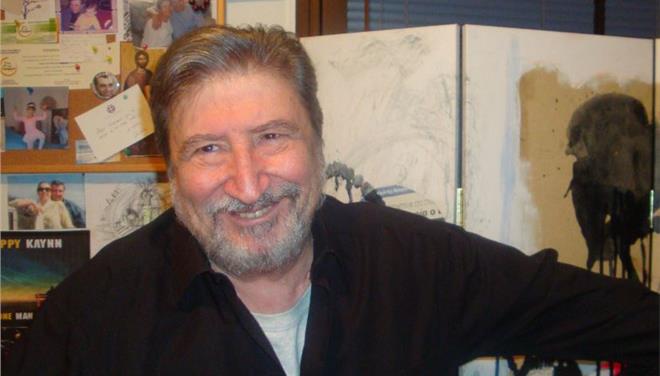Harry Klynn, aka Vassilis Triantafyllidis, was one of the most intelligent and insightful artists of the modern Greek scene. With his satire and his deep political vision, he managed to comment on and deconstruct, with humour and sarcasm, the pathologies of Greek society for more than four decades. From radio and recording to theatre, cinema and politics, Harry Klynn left an indelible imprint. He was there to remind us that laughter can be a tool of resistance, self-awareness and, ultimately, change.
From Katerini to the world satire stage
Born in 1940 in Katerini to a family of Pontian refugees, little Vassilis grew up amidst the poverty, deprivation and trauma of World War II and the Civil War. From an early age he shows an artistic inclination and a need to communicate with the public. At the age of 17, he makes the big decision to leave for the United States – not to pursue his dream, but to survive. In America, he works hard: he does odd jobs, plays music, studies acting and comes into contact with the stand-up clubs of the time. There he forms his artistic alter ego: “Harry Klynn” is born – a name that would be etched in the consciousness of Greeks when he returned and swept everything in his wake.

A satire that struck straight to the heart
His return to Greece is accompanied by an unprecedented success. In 1978, the album “Glorify Me” was released, which swept the sales and brought something completely new: a political satire of high intelligence, in a popular and perfectly understandable language. The public embraces him and the following releases – “Potatoes”, “Hail Caesar”, “Made in Greece”, “Nothing”, “In the flesh” – make history. The album is no longer just a record. It is a tool of social interpretation and political expression. Its characters, such as ‘Andreas’, ‘Divanos’, ‘Fonta’, were not just grotesque figures. They were mirrors of a society that was changing but carried with it the same pathologies: petty bourgeoisie, selfishness, self-serving, hypocrisy.
The man behind the jester’s mask
Harry Clynn was not just a satirist. He was a deeply political artist, with clear opinions and the courage to express them publicly, even when they were not “convenient”. His satire was spared no one – right, center or left. Everyone passed through his crosshairs in the same ruthless manner. His voice carried the anguish for a better world, for a society of justice and humanity. And he made this so clear that when he decided to enter politics, it didn’t seem strange. In 2011 he was elected as a councillor and later Deputy Mayor of Culture in the Municipality of Kalamaria. It was a natural continuation of his path: to contribute, to organize, to inspire and to mobilize.
The legacy of laughter with content
Harry Klynn passed away on May 21, 2018, at the age of 78. He left behind dozens of recordings, plays, books, political articles and of course a huge cultural legacy. He was one of those artists who never rested. He was not interested in easy acceptance. He wanted to shake his audience, to remind them who he was, where he lived and what he tolerated. Even today, his phrases remain alive, his lines are repeated, and many young satirists recognize him as their mentor. For Harry Clynn was not just an entertainer. He was a social mirror. And mirrors – even when they frighten us – are necessary.







